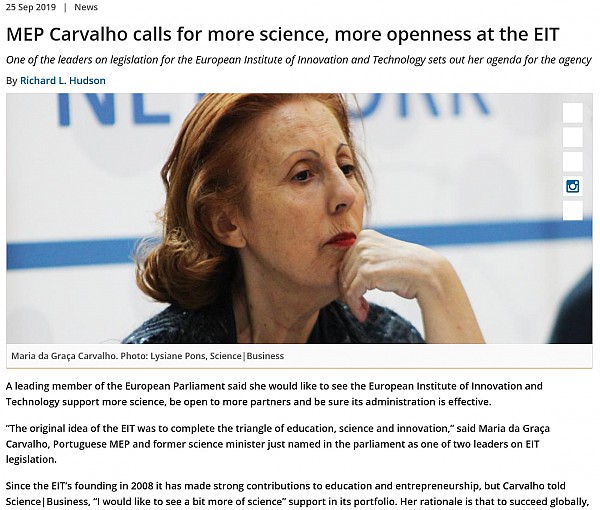Press MEP Carvalho calls for more science, more openness at the EIT
One of the leaders on legislation for the European Institute of Innovation and Technology sets out her agenda for the agency
By Richard L. Hudson
A leading member of the European Parliament said she would like to see the European Institute of Innovation and Technology support more science, be open to more partners and be sure its administration is effective.
“The original idea of the EIT was to complete the triangle of education, science and innovation,” said Maria da Graça Carvalho, Portuguese MEP and former science minister just named in the parliament as one of two leaders on EIT legislation.
Since the EIT’s founding in 2008 it has made strong contributions to education and entrepreneurship, but Carvalho told Science|Business, “I would like to see a bit more of science” support in its portfolio. Her rationale is that to succeed globally, European industry needs to be investing more in research – and the EIT is one way to help stimulate that. Carvalho cites the example of the aeronautics industry, which succeeds because its big companies work in close cooperation with the best aeronautics researchers to constantly improve their products.
She added that she also wants to be sure the EIT’s big public-private consortia, the Knowledge and Innovation Communities (KICs), are open to new members joining if qualified. That would include non-EU members, if they pay their own way. Carvalho said she had heard complaints from some newcomers, even inside the EU, who wanted to join KICs but found “that the EIT is still difficult to enter”.
And, following a critical EU audit of the institution in 2016, she plans to check that the institution has fixed the problems. A delegation of MEPs plans to visit the EIT headquarters in Budapest in late October.
What is the EIT?
The EIT is an EU-funded body that organises large, pan-European consortia of universities, big and small companies, and public sector organisations – together doing R&D, promoting spin-outs, and training young entrepreneurs. It currently manages eight such KICs, in sectors from energy to health, and under new legislation proposed by the European Commission will add two more during the 2020s, with a rise in its seven-year budget from €2.4 billion to €3 billion.
The EIT got started as a suggestion from then-commission president José Manuel Barroso to create an “MIT of Europe.” Carvalho was among his advisors in setting it up. But it quickly ran into political battles in Brussels, and in 2016 the European Court of Auditors sharply criticised its administration and value for money. EIT officials have acknowledged problems in the institution’s early days, but say they are fixed. And it claims its work has helped create more than 6,100 jobs, attract €1.5 billion in outside investment, train 2,300 graduates and support more than 2,000 ventures producing 900-plus products and services.
Carvalho is among a group of MEPs who are strong supporters of the institution, and who will be working on new authorising legislation starting later this year. The other EIT rapporteur, or leader on the legislation, is socialist Marisa Matias, also Portuguese. Both worked together on prior EIT legislation, and were members of an informal group in the parliament called “Friends of EIT.”
The EIT’s political position has been precarious, in part because the way Barroso initially financed it was by taking money from other programmes – not a good way to make friends in Brussels. In upcoming budget negotiations, the commission has proposed integrating the EIT into the overall budget for its R&D programmes, Horizon Europe, and connecting it better with other programmes, such as the European Innovation Council, which could help fund its start-up companies, and the EU’s big regional development funds, which could help fund its local KIC networks.
Carvalho said she doesn’t expect the new parliament, which began in July, to reopen negotiations on the overall Horizon legislation that were completed in the prior session. But key issues still to be negotiated by 2021 are the budget, synergies with other programmes, and non-EU participation. She will be pushing for greater collaboration among regional development, agricultural and R&D programmes. She would also welcome non-EU countries joining the EIT and other EU R&D programmes, on the proviso that “they pay for what they get,” plus cover the commission’s extra administrative costs of dealing with them.
In addition, Carvalho is following other legislation on public procurement, and would like to see EU governments putting more emphasis on buying European innovations rather than awarding contracts solely to the lowest bidders.
Along with these issues, Carvalho said she will be pushing to take up unfinished legislation to require better gender balance on the boards of publicly traded companies in the EU. This proposal was first put forward by former commissioner Viviane Reding, but didn’t get approved. A special problem, Carvalho said, is gender imbalance in science and technology professions, particularly in computing and telecommunications.
Editor’s note: This article was corrected 2 October. The name of the second rapporteur for the pending EIT legislation is Marisa Matias.
